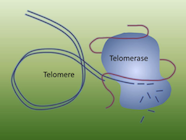Researcher profiles:
How do cancer cells maintain their longevity?
The ends of chromosomes are called telomeres, which get shorter each time the cell replicates. Once the cell is too old and the telomeres get too short, the cell is programmed to die. Cancer cells often overcome this constraint by hijacking the (usually very tightly controlled) mechanisms such as telomerase or the ALT mechanism (Alternative Lengthening of Telomeres) which can elongate the telomeres.
In this study, we are investigating how telomere length correlates with disease and to what extent the ALT mechanism relates to stress and/or activation of the p53 gene, the principal regulator of cell stress responses.
Relevant references
Jiang, W. Q. et al. Induction of alternative lengthening of telomeres-associated PML bodies by p53/p21 requires HP1 proteins. The Journal of cell biology 185, 797-810, doi:10.1083/jcb.200810084 (2009).
Chen, Y. J. et al. Association of mutant TP53 with alternative lengthening of telomeres and favourable prognosis in glioma. Cancer research 66, 6473-6476, doi:10.1158/0008-5472.CAN-06-0910 (2006).
Related topics
Role of alternative isoforms of p53 in cancers and inflammation

Funding
Collaborators
- Professor Richie Poulton
- Professor Roger Reddel (Sydney)
- Dr Hamish Campbell (Sydney)